- Home
- Nick Carter
Safari for Spies
Safari for Spies Read online
Annotation
Casablanca! Crossroads of international espionage… a glittering, decadent city minutes away from Africa's dark heart, where jungle drums still beat their deadly, insistent rhythms.
Casablanca! Where America's #1 counter-intelligence agent was to face his most explosive assignment.
* * *
Nick CarterYou Are Accused
"He'd Better Not Die"
Mysterious Africa
The Cockeyed Optimist
Aunt Abigail and Others
The Diplomatic Touch
Pierre Gets the Creeps
The Silent Visitor
A Hop, a Skip, and a Slump
Something Old, Some New
They Call the Dream Mirella
Things That Go Bump in the Night
The Dying Immortals
Duel in the Smoke
In a Moorish Garden
* * *
Nick Carter
Killmaster
Safari for Spies
Dedicated to The Men of The Secret Services of the United States of America
You Are Accused
There was not, so far as he knew, the slightest reason for anyone outside his official reception committee to be waiting for him in Dakar, but somebody else most certainly was. And it was much too early in the game for that.
Nicholas J. Huntington Carter stepped off the Jet into the cool African morning feeling both overdressed and oddly naked. New Panama hat, slim briefcase practically covered with initials, bone-handled walking cane to match the stiffness of his back… all this, when all he really felt like wearing was a set of bush khakis and a knotted handkerchief. But what the hell. This was a job, not a picnic. And it was going to be a sticky one, for all the diplomatic camouflage.
Something about using his own name made him feel stripped to the buff yet painted over with signs blazoning out his identity and purpose, HI, SPY! the invisible label announced. THE NAME IS CARTER. NICK CARTER. SECRET AGENT N-3, KILLMASTER FOR AXE. Beneath, in smaller print, the imaginary sign confided the inscription across his chest: TROUBLESHOOTER WITH LICENSE TO KILL. He could almost read the tempting invitation offering him as a target to anyone on the opposite side of the espionage fence. COME AND GET ME, RED, said the bullseye over his heart. READY, AIM, FIRE!
But nobody did. At least not right now.
It was probably because he felt so exposed that Nick sensed the eyes upon him from the moment he stepped into the airport building. They were watching him from behind a newspaper while Tad Fergus of the Embassy whisked him through the brief formalities of passage through Senegal and into the main arrival center to meet Liz Ashton and the two officials from Nyanga. And they stayed with him until they saw whom he had met.
Raphael Sendhor and Oscar Adebe, Foreign Minister and Vice President respectively, greeted Special U. S. Ambassador Carter with cool courtesy.
"We welcome you," their liquid accents said while their calm expressions denied, "on behalf of President Makombe, our country and ourselves. You wish perhaps for refreshment and rest before we complete out journey?"
"Thank you, gentlemen, but no," said Nick, his voice as soft as theirs and his manner as restrained. "I'd like to get to Abimako as soon as possible."
They nodded, satisfied, two very young and strikingly handsome ebony men from the six-month-old Republic of Nyanga.
"You will permit me, then," said Sendhor, bowing slightly. "The President's plane awaits. I shall lead the way. Your luggage…?"
"I have taken the liberty," said Tad. "It is on the plane."
Two multicolored flowing robes rustled and glided ahead across the marbled floor. Nick followed, flanked by Liz and Tad. The back of his neck was crawling, and the feeling had nothing to do with the gangling, redheaded Tad or the darkly attractive Liz Ashton. The sensation he got from looking at her was much more pleasant than the warning tingle that kept his instincts tuned in to some alien presence. Not just something unfamiliar; something wrong.
He saw the eyes upon him, bulbous and frog-lidded, staring over the top of a French newspaper. They rolled over him like greased ball bearings, and with such intensity that he could literally feel them on his body. They were ugly, glass-pale eyes, and the oddly olive-green cast of the skin rendered them even more horribly colorless.
Nick nodded attentively at something Tad was saying and scrutinized the watcher as they approached. He'll know me anywhere, Nick thought. And I'll know him.
"Do you recognize the fellow watching us from behind the newspaper?" he said conversationally. "Left front. He's very interested. Miss Ashton, how do you like living in Abimako?"
"Why, I…I like it very much," she stammered, slightly off-balance. "What man?"
The newspaper went up like a flag as they passed.
"Good God," murmured Fergus. "Literally green in the face. Jealous of the company we keep? Never saw him before. I'd remember if I had."
Nick grunted softly to himself. The three Americans followed the young African leaders out of the terminal and back onto the airfield where President Julian Makombe's private plane waited.
The pale pink glow of early morning turned into the orange blaze of a hot day as they stepped into the plane.
Moments later the two-engined Skycraft was soaring high above the gleaming coastline of West Africa toward the tiny capital of newly independent and deeply troubled Nyanga.
Nick put aside his cane and stretched his long legs beneath the seat in front of him. Sendhor and Adebe had finished lavishing cool courtesies upon him and were sitting together in silence. Tad Fergus and Liz Ashton, respectively First and Second Secretaries of the bombed American Embassy in Nyanga, were sunk in a silence of their own, wondering just what this sleek-haired, bespectacled and almost too-handsome man with the rakish chin and foppish cane could possibly do about the mess in Nyanga.
Nice looking, thought Liz. Probably conceited. Special emissary. Big deal. What does he know about Africa and its problems? Suppose he thinks this is going to be another Washington cocktail party and a lot of backroom baloney. He'll learn. Sure, he'll learn, she thought resentfully. And go back home to report the facts while the whole damn country blows itself to bits.
Tad Fergus chewed his lip thoughtfully. Nyanga was his second assignment in Africa, and he wanted it to last. He loved the country, its golden beaches and white deserts, its stretches of hilly scrubland that changed from pearl-pink to blazing red to deep purple with the passing of each day, its proud handsome people who wanted so very much to be the masters of their own destiny, the flamingoes and the bark canoes on its cool, dangerous waters, and the sharp bite of air untainted by the belch of factory fumes. Even the modern capital city of Abimako was clean and airy. Its builders had planned it as a tree-lined, streamlined model city of the new Africa. But something was going horribly wrong. He glanced sideways at Nick Carter. So. This was the man who was supposed to set everything right. Funny that he'd never heard of him before.
The small, plush presidential plane droned smoothly on. Nick stared out of the window at the vividly tinted clouds and wondered if a killer spy was really the right man for a delicately diplomatic mission. But wholesale murder was never delicate, and diplomacy had already fallen on its face.
He looked down as Sendhor called his name and pointed. The plane banked sharply and circled low over drifting wisps of smoke. What lay beneath the smoke was the remnant of a ravaged village. Charred stumps of huts pointed starkly at the sky, and what was once a grain field was a vast black scar. There was not a living soul or an animal in sight.
"Yesterday," Tad said tightly, his red head thrusting past Nick's. "In broad daylight, with a band of kids in front of them. No one believed they really would attack. But they did. A few of
the women in the fields got away. A handful of men and children wound up in the hospital. The rest — just didn't leave. The troops got here last night. Too late, as you can see. The bush telegraph isn't quite as miraculous as people like to think." His last comment was full of bitterness, as though outsiders like this Carter were full of misconceptions about the Africa Tad Fergus loved so well.
Nick pulled his eyes away from the scene below. Sendhor and Adebe were looking at him with ill-concealed dislike. Tad's face was an angry mask and tears trembled in the corners of Liz' eyes.
"They think we could do a thing like that," she whispered.
"Who else?" said Sendhor, his fine lips twisted with contempt.
"We'll find out who else," Nick answered flatly, his eyes flint-hard and his jaw set. "Let's get this plane to Abimako and get on with it."
Theoretically, he knew "who else." The problem was to find him. And deal with him accordingly.
Nick's role as a high ranking diplomat on a special trouble-shooting mission had begun with an urgent summons followed by detailed instructions from Hawk, who seemed to think that one free weekend between assignments was enough vacation for any man. Carter had mumbled to himself, said goodbye to the girl and hopped the first plane home to New York for briefing and new orders. The head of AXE had long since given up the luxury of spare time for himself and was apparently under the impression that his top secret operative would, too.
When Nick had gone to meet the others in a small conference room at United Nations headquarters he had already transformed himself into a top State Department official with the mental intensity of a Robert Kennedy, the cool geniality and drive of a Sargent Shriver, and the quietly determined bearing of the Secretary of Defense. He hoped he had chosen suitable models.
The Secretary of State for African Affairs sucked quietly on his pipe and waited for Polikov to finish with his small talk and settle down. His eyes wandered over the group around the table and he thought suddenly how insignificant the meeting seemed and yet how important it really was. Four men and himself versus the disintegration of a newborn African nation and a probable showdown with the U. S. S. R. There were other channels of mediation, true, but he knew instinctively that in spite of all the talk that might follow failure, the AXE mission was their only real chance to save a situation that had grown rapidly from minor incident to murderous chaos and from slight mistrust to hatred and suspicion.
Polikov and Mbanzi, of course, had never heard of AXE. The Secretary for African Affairs devoutly hoped they never would. Sending a spy with the title of Killmaster on a fact-finding expedition was scarcely a move calculated to inspire confidence in the plaintiff. In fact, it could just blow everything to hell. But the President himself, with the full support of the National Security Council, had felt that this was a job for Hawk's department. He had mentioned Nick Carter specifically by name.
The Secretary tapped his pipe on the huge ashtray and cleared his throat.
"Gentlemen," he began. "As you all know, I have already held a preliminary meeting with the representative from Nyanga, which I followed with discussions on a presidential level. The Russian Ambassador in Washington has filed a protest with the United States. As a result we are meeting here today in an effort to clarify the situation and agree upon our course of action."
He shifted uncomfortably in his chair, thoroughly disliking the formal language he felt obliged to use. Hawk eyed him sympathetically and chomped quietly on his evil-smelling cigar.
"We have all met informally, «Dusty» Thompson continued. "Now I should like to explain why each of us is here." Serge Polikov produced a knowing smile. Nick disliked him instantly. "Dr. Tom Mbanzi is the head of the United Nations delegation from Nyanga, which became an independent nation on September 7th of last year. He is here because President Makombe of his country prefers to conduct negotiations under the auspices of the United Nations, rather than lodge formal governmental protests. If our present efforts fail — and it is vitally important that they do not — both Nyanga and Soviet Russia will call for a meeting of the Security Council, and Nyanga will break off relations with the United States. The Soviet Union," he added, turning a cool gaze upon Polikov, "has mentioned the possibility of employing more drastic measures. I prefer not to detail them at this point." Polikov grinned wolfishly. "Mr. Polikov of the Russian delegation is here at the request of President Makombe as well as of his own government, since their interests in this matter are so closely related. Mr. Hawk and Mr. Carter are here as special representatives of the United States Department of State. The President of Nyanga and the President of the United States have agreed to send a fact-finding mission to Nyanga, one that will be in constant personal contact with both governments. Mr. Hawk is to remain in New York as the liaison official. Mr. Carter will go to Nyanga as troubleshooter on the scene." Polikov snickered and repeated, "Troubleshooter!" Thompson regretted his choice of word even as it came out. Polikov would pick it up and make something of it. But Mbanzi was eyeing the Russian with the faintest of frowns. Good. Dusty Thompson had liked this young African scholar and diplomat from the moment of first meeting. And he had not liked the sneering Polikov. Because he was a Russian? Thompson pushed the thought away.
"And now, Dr. Mbanzi, if you would be so good as to describe the situation in your own words?" Thompson gratefully clamped his pipe between his teeth.
Mbanzi began to speak in the lilting, melodic tones of the African who is fluent in many languages and yet still loves his own for its richness and its subtleties. He looked at Hawk and Carter while he spoke, and saw a soldierly old man with gimlet eyes and a youngish athlete with the brow of a savant. Both looked hard as nails and immensely capable.
"I will touch only upon the salient points," Mbanzi said. "Every incident has been documented. I have here more reports for you to read." He laid his hand briefly on a pile of papers. "In substance, my country has been plagued since the day after independence. There has been fighting in the streets of Abimako. Government officials have received mysterious threats. Every day there is shotgun fire. A bomb was exploded in the President's own garden. The Russian Embassy has been bombed. Russian individuals — technicians and government personnel — have been terrorized. Armed bands have started to roam the countryside, threatening to kill and burn and pillage until the people overthrow the government. Everything that could possibly happen to give my country a bad name and to topple its elected officials is happening. Even to stirring up peaceful tribespeople and making a rebel army out of them. Hospitals stoned. Missions burned. Our friends from the Soviet Union, murdered." He stared at Dusty, his strong young face accusing. "Why this pattern of terror, when all was peace before? Julian Makombe was elected by the people. They used to honor him. It is not by themselves that they have started to destroy. They have been influenced from outside."
"By what you believe to be undercover agents of the United States," Hawk said bluntly. "Where is your proof, and what could be the motive?"
"The proof is in tape recordings, in photographs, in pamphlets, in the laboratory," Mbanzi said intensely. "An American voice broadcasts incitements to riot. Leaflets are handed out, with drawings and slogans in the American style. Weapons and bomb fragments have been recovered. They are American. As to motive…"
Polikov laughed. "It could not be more obvious, surely? The whole world knows that the United States Government supported the rightist Karumah for the Presidency and that President Makombe studied in Moscow, that he believes in the Communist dream. It is only too clear why the Americans are trying to make his government fall, to discredit his country and the new regime. And to go so far as to persecute Soviet citizens…!"
"I understand that the American Embassy in Nyanga was also bombed," Carter cut in. "You do not regard this as persecution?"
The Russian snorted. "On a weekend, when no one but the domestic staff was there! An obvious cover action. A foolish, naive ploy designed to cloud the issue."
"And these bomb f
ragments, Dr. Mbanzi," said Nick. "Standard American weapons are easy to come by. Voices and pamphlets are simple enough to fake. But bomb fragments do not usually bear the maker's name. May I ask how and where they were analyzed?"
"In Moscow," Mbanzi answered, looking at Nick steadily. "By the expert Rubitchev, whose scientific integrity is unassailable."
Polikov smirked.
"We will naturally expect to see the original copy of his report," Hawk said coldly. "The original. However. That is a detail we can take up later. First, Dr. Mbanzi, another question. If your government is so convinced that the United States is behind all your present troubles, why did your President specifically request an American investigative mission? Since you have chosen to direct your discussions under the wing of the United Nations, why not request a United Nations team?"
Tom Mbanzi locked gazes with the leathery old man with the pioneer's face and startlingly sharp eyes. At last, he said: "So far, it is a matter between my country and yours. The accused has the right to face the accuser. Even the Russians who have suffered are on our soil and are our responsibility. It is your responsibility, your right, to prove that our accusations are untrue."
It sounded like a declaration of ancient tribal law, or of a law so just and simple that it could only be practiced in the new world of the future.
Hawk smiled one of his rare smiles.
"You honor us," he said.
The meeting settled down into a discussion of specifics.
* * *
Later, behind the brownstone façade of the AXE branch office near Columbus Circle, Nick went over the final details with Operations and had one last talk with Hawk.
"For almost the first time in my life," he said, "I feel like a fraud. I hate to lie to a man like Tom Mbanzi."
Hawk puffed busily at his cigar. "And for almost the first time in your life, you're going to have to be someone very much like yourself. That's far from being a fraud. And I think you'll find that Julian Makombe won't be too surprised if you're a little unorthodox. He's not expecting a stuffed shirt. Don't try to be one. Mbanzi was sincere when he said what he did about the accuser and the accused. But Makombe went one better. He is not convinced that the U. S. is behind his troubles. He's testing us, in a way. But he thinks it's just remotely possible that there may be some other force at work. We know there is."

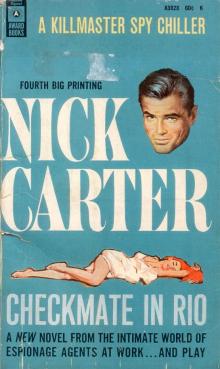 Checkmate in Rio
Checkmate in Rio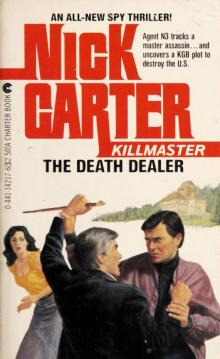 The Death Dealer
The Death Dealer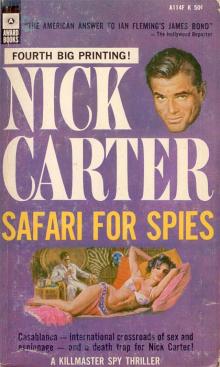 Safari for Spies
Safari for Spies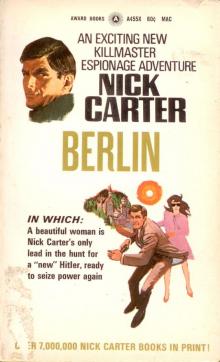 Berlin
Berlin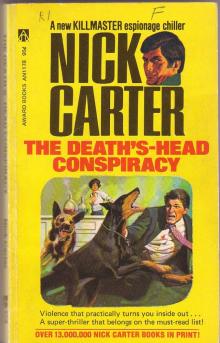 The Death’s Head Conspiracy
The Death’s Head Conspiracy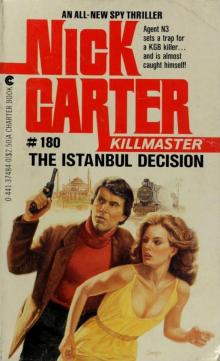 The Istanbul Decision
The Istanbul Decision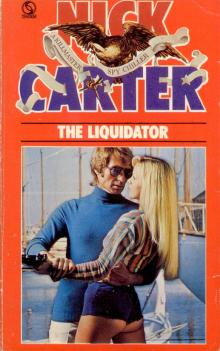 The Liquidator
The Liquidator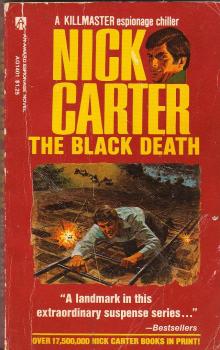 The Black Death
The Black Death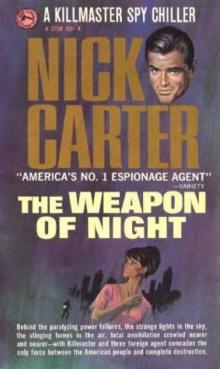 The Weapon of Night
The Weapon of Night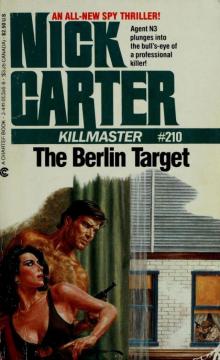 The Berlin Target
The Berlin Target Temple of Fear
Temple of Fear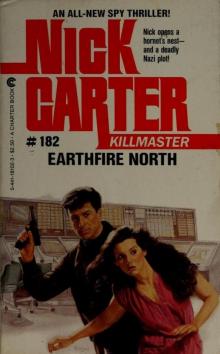 Earthfire North
Earthfire North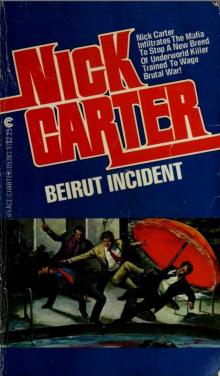 Beirut Incident
Beirut Incident White Death
White Death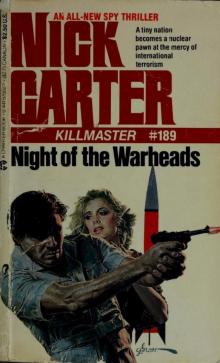 Night of the Warheads
Night of the Warheads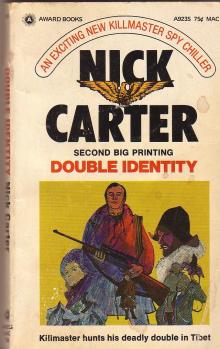 Double Identity
Double Identity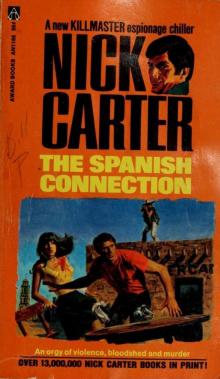 The Spanish Connection
The Spanish Connection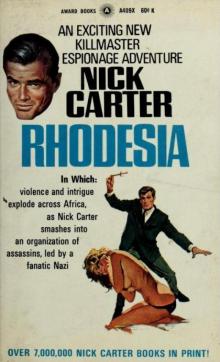 Rhodesia
Rhodesia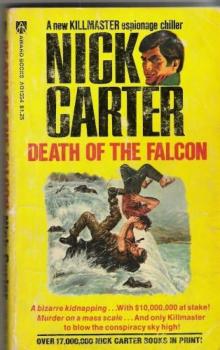 Death of the Falcon
Death of the Falcon The Executioners
The Executioners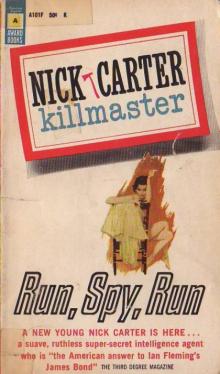 Run, Spy, Run
Run, Spy, Run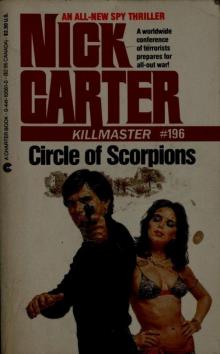 Circle of Scorpions
Circle of Scorpions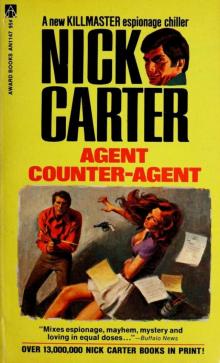 Agent Counter-Agent
Agent Counter-Agent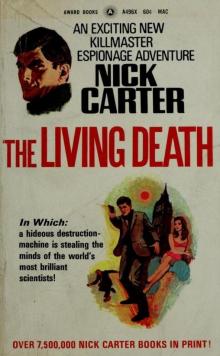 The Living Death
The Living Death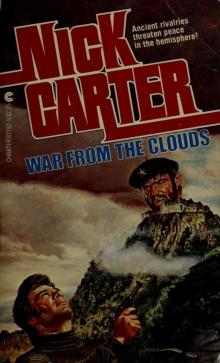 War From The Clouds
War From The Clouds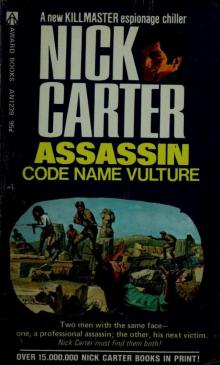 Assassin: Code Name Vulture
Assassin: Code Name Vulture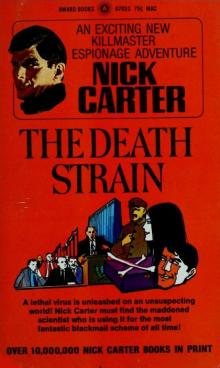 The Death Strain
The Death Strain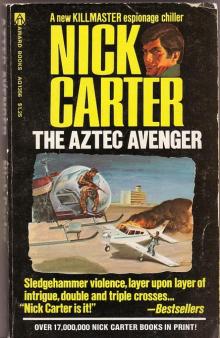 The Aztec Avenger
The Aztec Avenger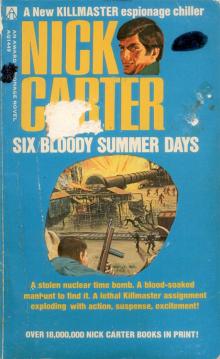 Six Bloody Summer Days
Six Bloody Summer Days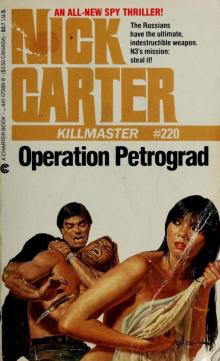 Operation Petrograd
Operation Petrograd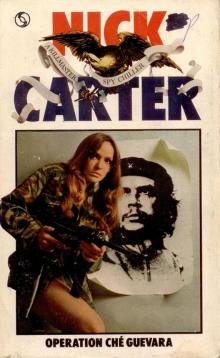 Operation Che Guevara
Operation Che Guevara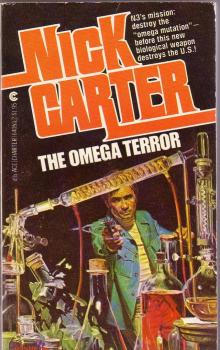 The Omega Terror
The Omega Terror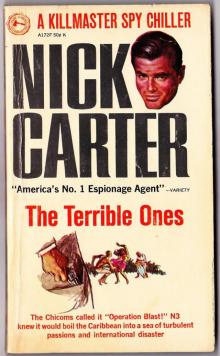 The Terrible Ones
The Terrible Ones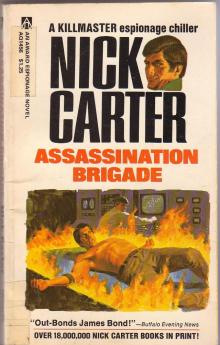 Assassination Brigade
Assassination Brigade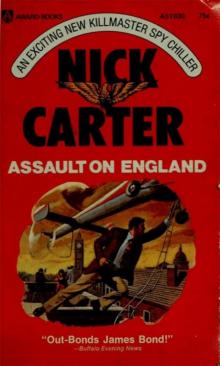 Assault on England
Assault on England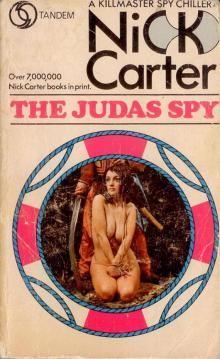 The Judas Spy
The Judas Spy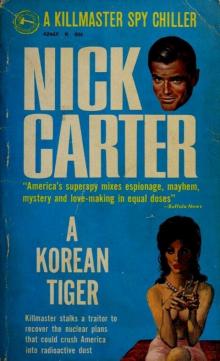 A Korean Tiger
A Korean Tiger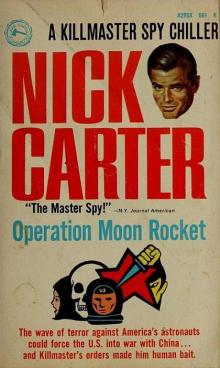 Operation Moon Rocket
Operation Moon Rocket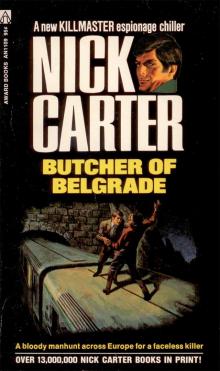 Butcher of Belgrade
Butcher of Belgrade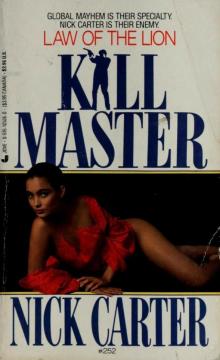 Law of the Lion
Law of the Lion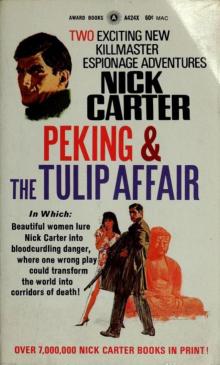 Peking & The Tulip Affair
Peking & The Tulip Affair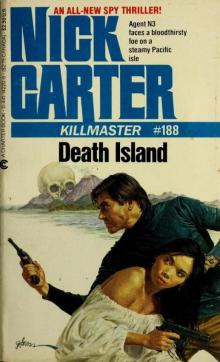 Death Island
Death Island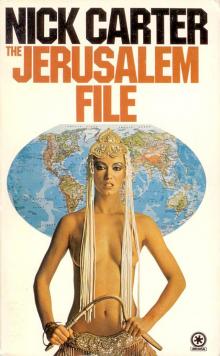 The Jerusalem File
The Jerusalem File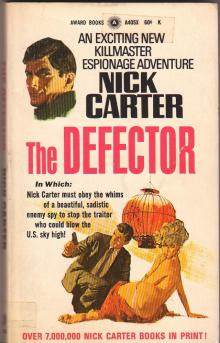 The Defector
The Defector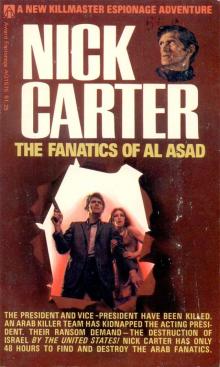 The Fanatics of Al Asad
The Fanatics of Al Asad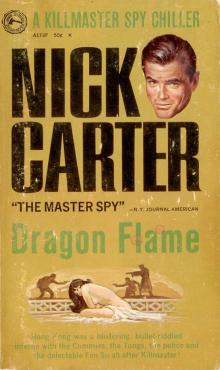 Dragon Flame
Dragon Flame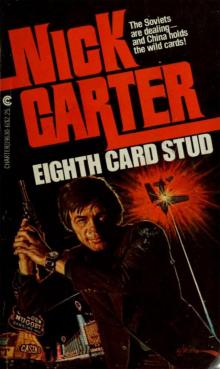 Eighth Card Stud
Eighth Card Stud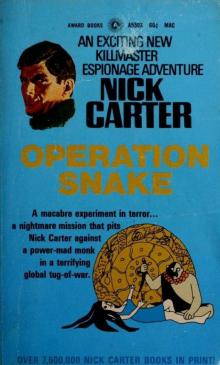 Operation Snake
Operation Snake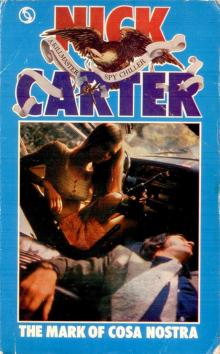 The Mark of Cosa Nostra
The Mark of Cosa Nostra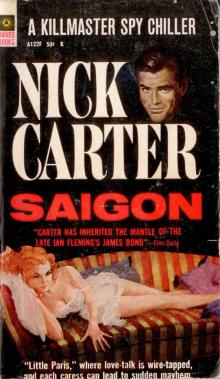 Saigon
Saigon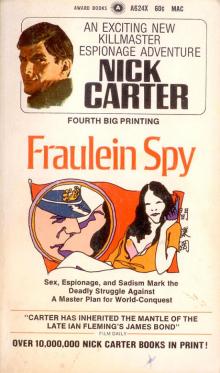 Fraulein Spy
Fraulein Spy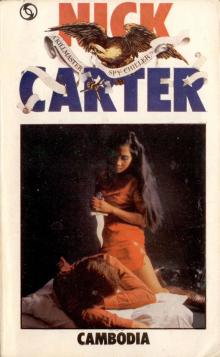 Cambodia
Cambodia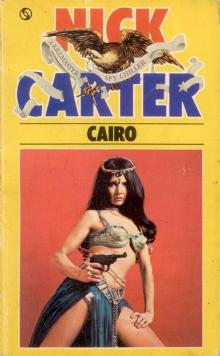 Cairo
Cairo